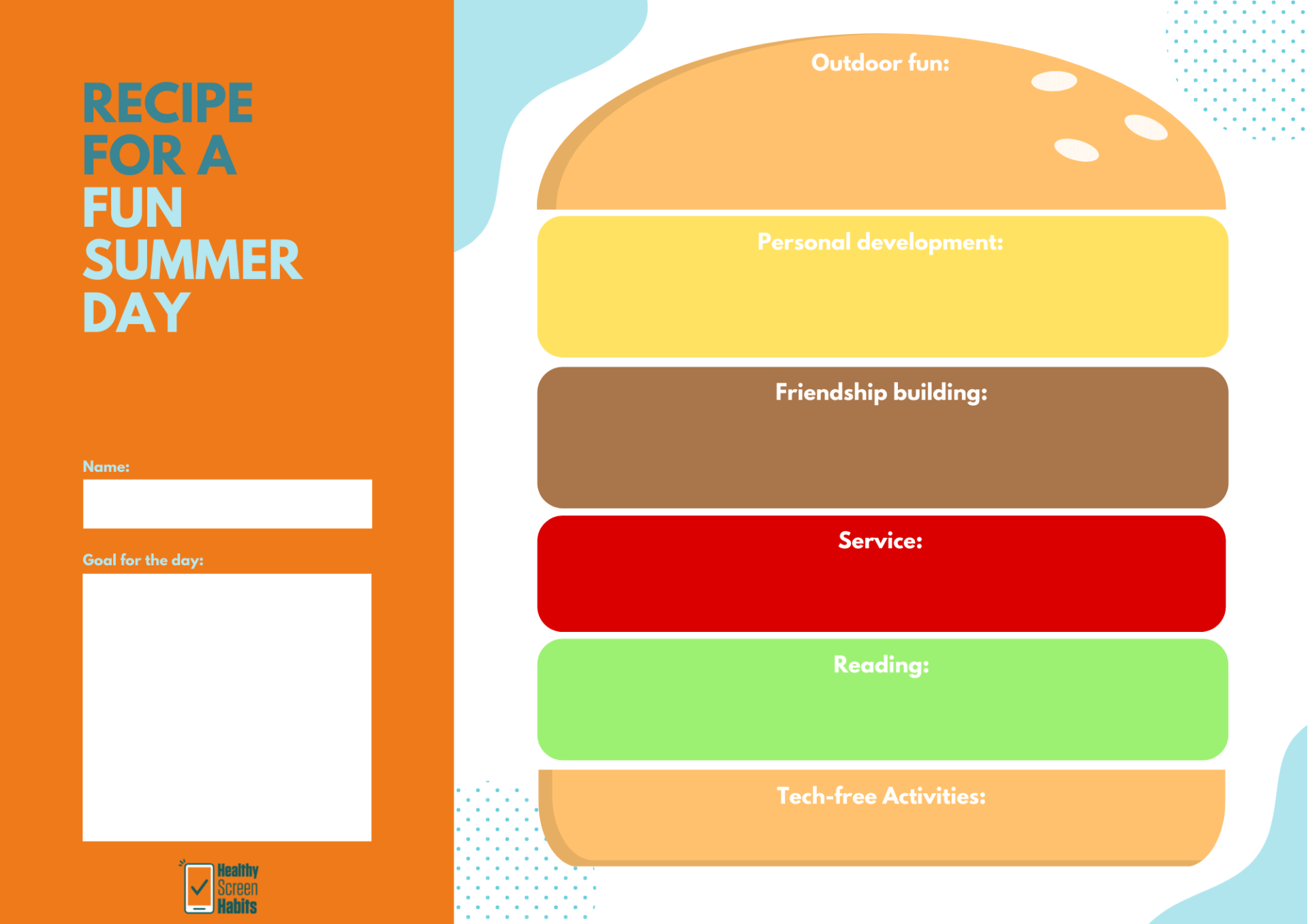S4 Episode 10: Summertime Healthy Screen Habits & Hacks // Healthy Screen Habits Board
Hosted by Hillary Wilkinson
"When it comes to making sure that summertime doesn't end up being just a great big screen-fest, it all comes down to being intentional with it and having clear and consistent policies in place."
-Julianna Lorenzen
Summer is barreling down on us and while some are ready for the lazy mornings and unscheduled days, others are already starting to agitate over how to navigate these coming weeks without succumbing to the allure and ease of too much screen time. This week we get the full collective knowledge of the moms of Healthy Screen Habits– Amy Adams, Jeannie Ondelacy Sprague, Julianna Lorenzen, and me, Hillary Wilkinson– to share our tips, tricks and hacks on how to have a balanced summer with tech.
Healthy Screen Habits Takeaways
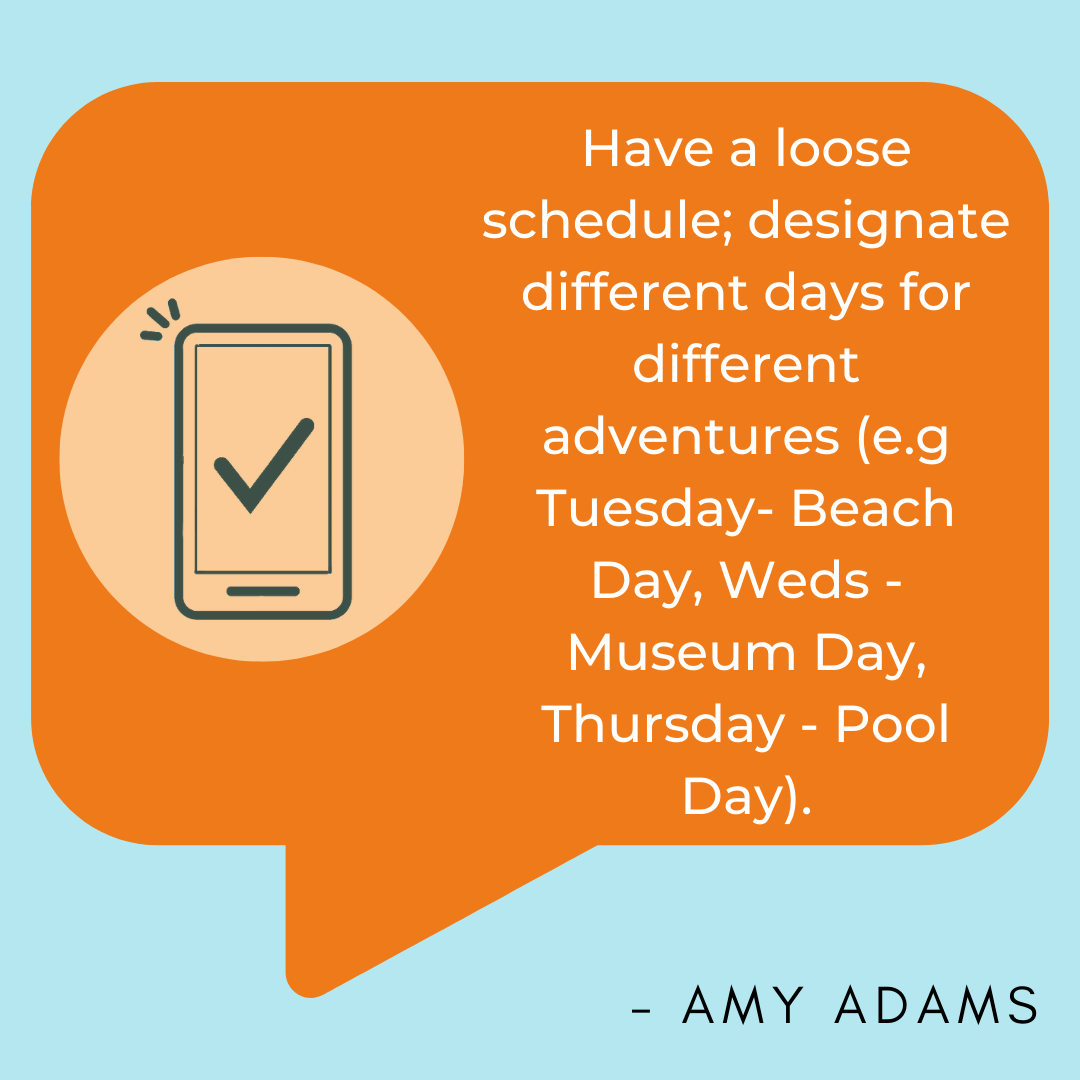
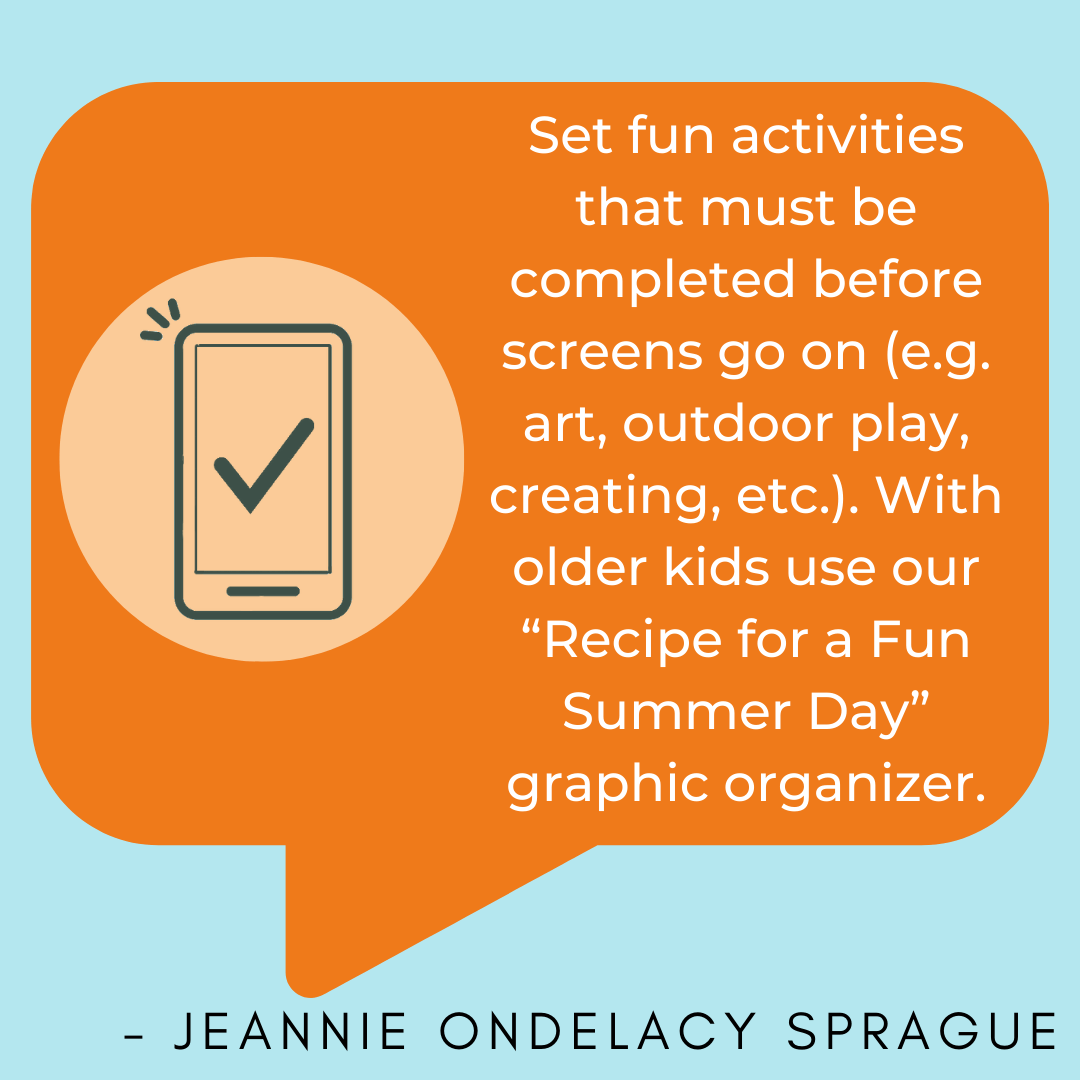
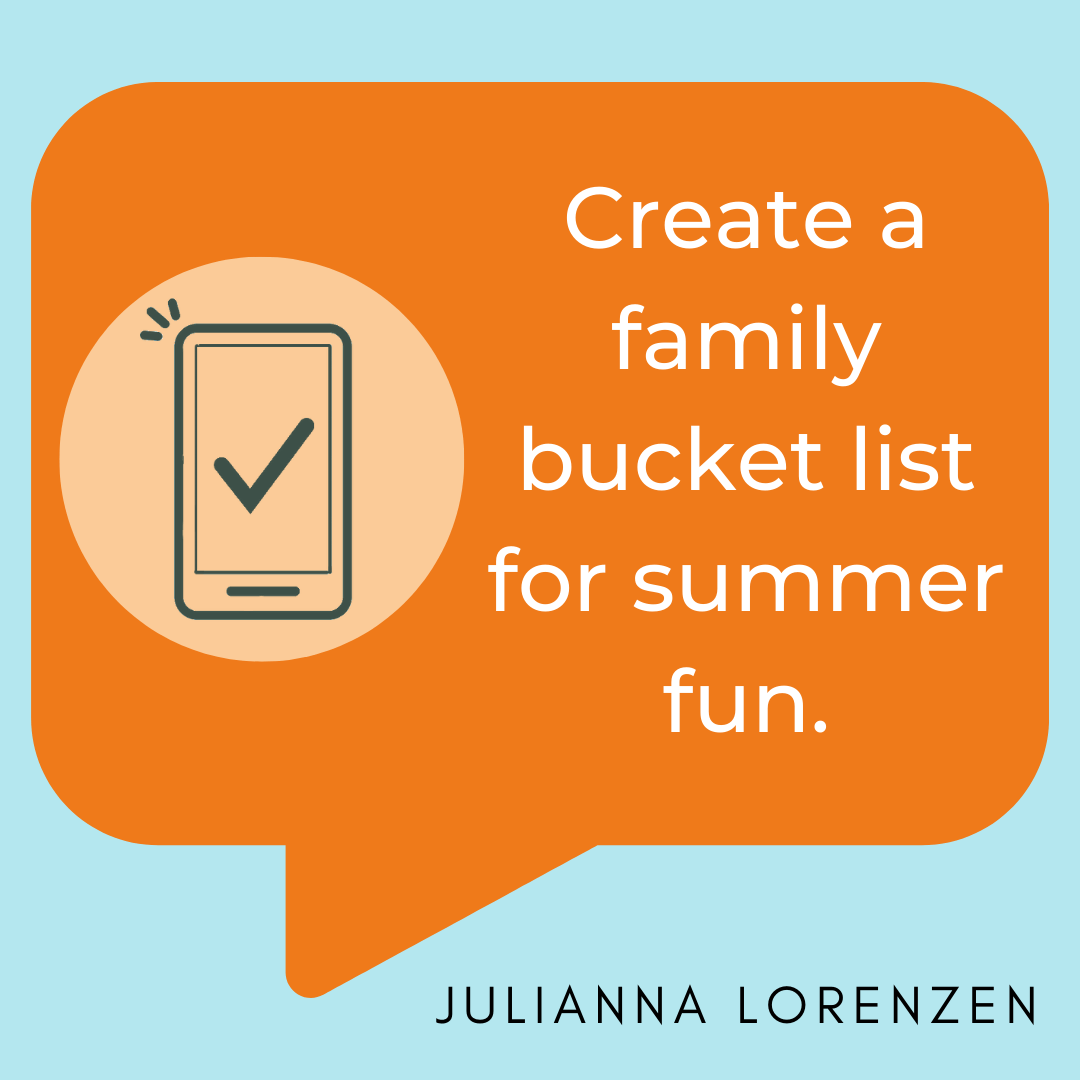
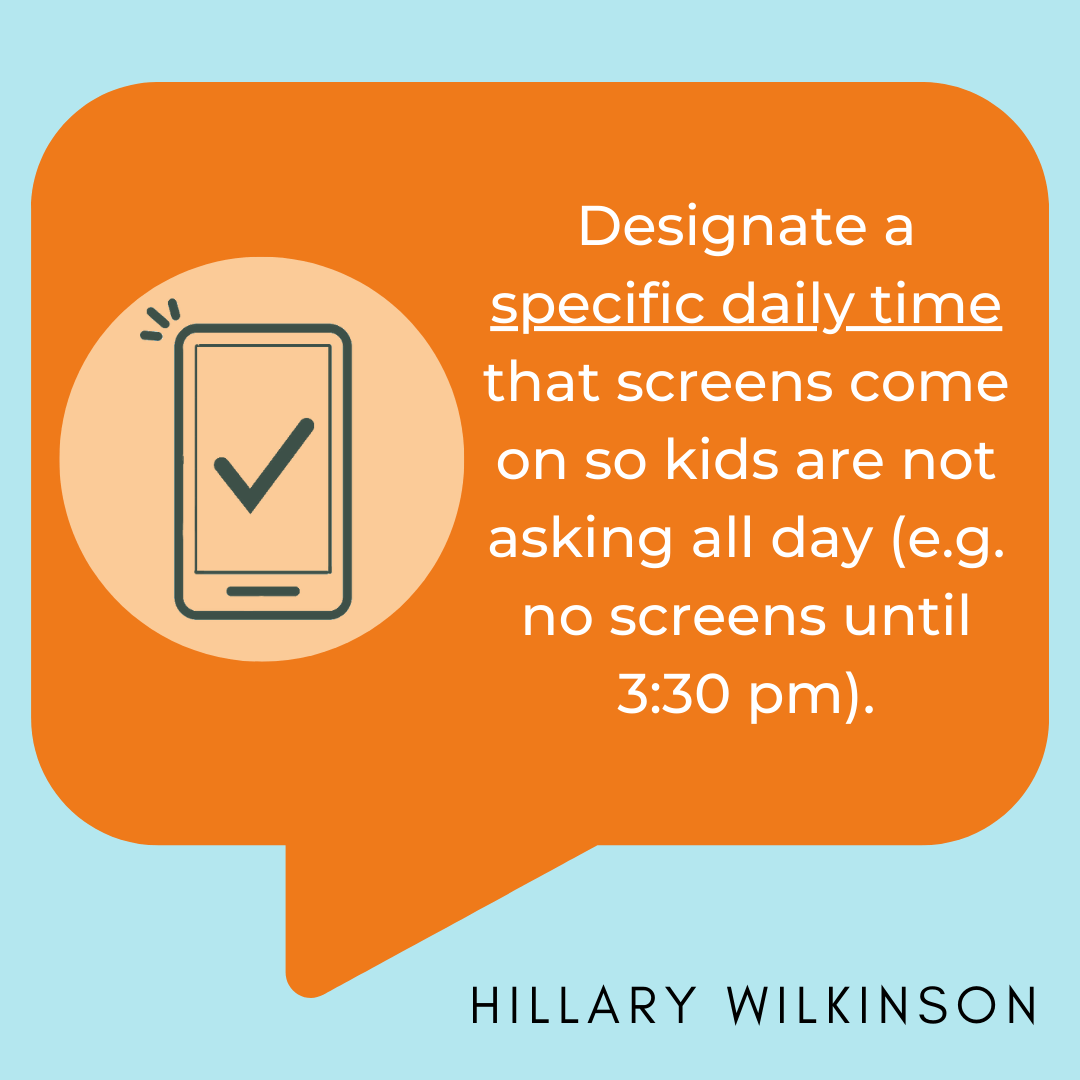
Resources
Resources Mentioned:
https://littlefreelibrary.org/
Recipe For a Fun Summer Day Graphic Organizer
Need help keeping your kids from turning to screens all summer long?
We've got you covered! Try using this graphic organizer to help your child plan some tech-free activities and accomplish some goals.
Download this free printable so your child can spend the summer focusing on: Outdoor Fun, Personal Development, Friendship Building, Reading, and Service Opportunities.
Show Transcript
Hillary Wilkinson:
Summer is barreling down on us. And while some of us are ready for the lazy mornings and unscheduled days, others are already starting to agitate over how to navigate these coming weeks without succumbing to the allure and ease of too much screen time. So rather than focus upon one guest to come up with a list of tips this week to keep our families engaged, entertained, and healthy. I am going to ask a brain chest, a collective, if you will! Some of the most committed moms I know who are determined to balance screen time with green time, allow for real life experiences and respect that sometimes all our kids wanna do is just veg out with some tech. So I didn't have to look too far to find this base of experts, as you would imagine - they are the women I consult with all the time!
Hillary Wilkinson (13:22):
I ask them how to handle my day to day challenges. And I rely upon them to keep me updated with the latest research. It's the folks right here at Healthy Screen Habits and they practice great digital wellness. And I wanna share some of their tips with you. So first up I have Amy Adams. If you follow us on Instagram or Facebook at Healthy Screen Habits, you know that Amy is the leader of our online book club. Every couple of months, she selects a new book to read and breaks it down weekly to bite-sized bits to deliver the most pithy and meaningful takeaways. She kind of does the big work. So the rest of us can just get the goods. Amy is a mom of four, licensed social worker, and a member of a local school board. She's my absolute go to when I need emotional support or a different perspective to view life with teens. Thanks for being here. Hi Amy!
Amy Adams (14:27):
Hi Hillary. Glad to be here.
Hillary Wilkinson (14:30):
So Amy, because you are our literary guru, I'm going to put you in the hot seat regarding summer reading. Every year we hear about summer brain drain and the need to keep our kids engaged with text and literacy and reading. How do you uphold this at your house?
Amy Adams (16:12):
Okay. So I love reading if I could sit around and just do nothing but read all day, I would be in heaven. Um, but you know, our kids have varying levels of interest in reading. Some of my kids are really into reading and other of my children, I won't name names, but other of my children aren't super into it. So, you know, how do you kind of motivate your kids to read? Cuz reading is so important and it's, you know, it's really important to me and I, and I know it's really important for them, um, for their continual learning and, and just, it's a great activity. So a few little things we've done and my kids are, you know, all, you know, range in age from elementary to high school. So I kind of have the whole gamut here. Um, but I love, I can't say enough about libraries.
Amy Adams (16:57):
I know that seems like a really simple answer, but we love the local library. So it's kind of a fun little thing. We almost every single year, the first day of summer, I take my kids to the library and let them just choose out a whole bunch of books. Um, and then the libraries always have, you know, a great little summer reading program, most libraries throughout the country do this. And in addition to that, a lot of libraries also have other fun little programs throughout the summer as well. Um, whether it's like magic shows or nature box or just other little things. So check out your local library. Another thing we do too is we don't just go to our local library, but we happen to be surrounded by other really cool cities with neat library. So we go check out their libraries and maybe get some variety cuz you know, some libraries are bigger and have more variety and it's fun for kids to kind of peruse those things.
Amy Adams (17:47):
Um, but another thing that I really wanna do this summer with my kids is to go on like a scavenger hunt of the Little Free Libraries. So we happen to live in a community that has a bunch of these. In fact, my son did this for an Eagle scout project where he built two of them. So we're gonna go do little maintenance on that. But those are really fun cuz it's like a little treasure hunt because you never know what you're gonna find in a, in a Little Free Library. So you can easily go to, you know, you can Google Little Free Library and find a little map where it has them in your community. And it's just a fun little thing because you really don't know what you're gonna find. You might find, you know, all little kids books, you might find whatever, but it's, it's simply a fun activity for your kids of all ages.
Hillary Wilkinson (18:33):
Fun fact, Amy, one of the first places that we ever met was actually taking our kids to story hour.
Amy Adams (18:43):
It was! That’s where I met you, Hillary!
Hillary Wilkinson (18:44):
Yeah, yeah, yeah, yeah. I think it was uh, library story hour and swimming lessons was what brought us together. Yep.
Amy Adams (18:50):
Yep. See libraries connect many!
Hillary Wilkinson (18:52):
<laugh> yes. Okay. So the reading and screen time, they kind of, you know, they're both inactive type engagement. It's all of that. Like how do you, how do you not have kids on screens and have them reading instead?
Amy Adams (19:21):
So I've done different things. You know, I don't necessarily do the same thing every summer. Um, something we've we've done though is like, you know, we don't, we have zero screens in the morning and morning time is reading time and I kind of say, okay, every kid needs to read for at least 30 minutes. Now some of my kids it's like, oh, do I have to do that? Others of my kids will read for two, three hours just depending on what kind of book they're reading. So I kind of try to make these blocks of times where this time is reading time and maybe afternoon time we schedule some time in for some screens or whatnot. Um, but really just trying to kind of block my time out like that has worked well for our family. But just for me, always kind of remembering in the back of my head, I need to schedule time for reading. That's really important to me is cuz if I don't schedule reading time, it it's not probably gonna happen for most of my kids.
Hillary Wilkinson (20:10):
I, I totally agree. I, even until, I mean, my kids were well, well beyond the age of napping and we still had what we called R and R every day, which was reading and resting time and it was, you know, everybody would just, and including me, I, I, I made sure to uphold it because I took that hour for reading and resting myself.
Amy Adams (20:34):
Yeah. Great. Cause who doesn't want reading and relaxing and resting time. Right?
Hillary Wilkinson (20:39):
I know there are gonna be some people who, and by people, I, I mean our children <laugh> who are going to really push to read on a tablet. Can you talk about what, um, do, is it okay with you if your kiddos read on a tablet versus an actual book?
Amy Adams (21:02):
So for my kids, we generally just read on paper and paper books. Um, there's a lot of research into that. Um, there's a, there's some great research about how we read differently depending on the medium that we're reading and whether it's on, you know, electronically or paper. So when we read electronically, we tend to do something called skim and skip. And that's just, cuz we're trying to, you know, think about how you're trying to scroll down your smartphone. You're just getting the base of things. And when we read a book, we, you know, we, we're kind of immersed in it. And so what they're finding is that people are now, so if you read, you know, books on tablets, people are now kind of starting to like see that the same way and they're skipping and skimming and they're just not as immersed in it.
Amy Adams (21:51):
Um, and so I generally try to, you know, to stay on the books, I think it's also fun for kids to see their progress physically, especially for kids that are maybe more reluctant readers to say, look, you know, you're halfway down and you show them like you've gotten through half this book or when they finish a long book to say, you read that all on your own. Like that's, that's really impressive. So I think there is something wonderful about having, getting to hold that tangible thing where you're literally turning the, you know, the pages. Um, but I, I mean I, if it's between a tablet or nothing, obviously a tablet, so I don't, I'm not, you know, I don't try to say it's terrible, but I just, I really love, there's just something really special about holding a book in your hands.
Hillary Wilkinson (22:31):
Right. And I agree, I think that kind of holds hands with, um, the going to the library, the physicality of the carrying the heavy stack of books and all of, all of the stuff that goes with that.
So Amy, as you know, on every episode of the healthy screen habits podcast, I ask each guest for a healthy screen habit, which is a tip or takeaway that listeners can use in their own home because this is a very special, different type of episode that it's just, it's, you know, the healthy screen habits crew, I'm going to ask for something a little bit different and that is a summer sanity hack. So this is going to be something that you put in place in your home that gets you through the summer days a little bit easier. It doesn't have to be screen related, but do you have a summer sanity hack?
Amy Adams (23:27):
I do. So what I have found that works well for my family is I, because if I'm just looking at a whole week, it's like sometime a little stressful sometimes cuz I'm staring it down thinking like, oh, I've got all this unstructured time. What do I do with my kids for the next five days? So I have found that I block out certain days for certain activities. So, you know, every Tuesday we always go to the beach and every Wednesday we go and explore some new museum and every Thursday we go to a different pool or do some sort of water activity and you know, I'll switch those up. But that was really, really helped me to kind of get through it. So there's some sort of structure and yet I'm not overly, I'm not an overly structured person. So, but I do like to have some sort of structural framework and then my kids also know what to expect like, oh, it's museum day today or, oh, it's, you know, it's beach day today. And so it's kind of, it's kind of fun for everyone to, for them to know what to expect and, and to have that variety.
Hillary Wilkinson (24:27):
Right. And I like having a theme of like, oh, it's a pool day. Like Thursdays are a pool day. So if you're in a community with that has community pools, you can go, you know, take turns, hosting friends or go to other people's community pools and just move around the town like that.
Amy Adams (24:49):
Yeah. And I would highly recommend that too. Getting together with the, you know, with your friends, whether it's your school friends or neighborhood friends or wherever, and just kind of having other moms, you know, do this with you, cuz it's fun. It's fun to go with friends to the pool. It's, it's a lot more fun than going by yourself. So we're having the beach day. Everyone knows that, you know, whatever Tuesday is beach day. So it, it makes it really fun for the kids and for the moms to have friends.
Hillary Wilkinson (00:08):
Up next is Jeannie Sprague. Jeanie serves many roles at Healthy Screen Habits and in her community, she always has a steadfast cheerfulness and calm yet “can do” attitude that keeps the rest of us afloat. Jeannie is a mom of 4 responsible for the healthy screen habits website and our own in-house IT Department <laugh> with a degree in educational psychology. Her goal is to help people find balance in how they use their media. I know she keeps me balanced all the time! And I can't wait to hear her summer Healthy Screen Habits. Welcome to the podcast, Jeannie!
Jeannie Sprague (01:03):
Well, thank you friend. It's fun to be here.
Hillary Wilkinson (01:06):
Yay. Jeannie. Oftentimes we talk about screens and how they in and of themselves are not necessarily like the bad thing. It's actually the amount of time that tech is commanding and what our time spent on devices keeps us from doing that's the greater concern. So how do you make sure that your crew has a balanced summer?
Jeannie Sprague (01:33):
We have a lot of outdoor activities that we try to do, especially in the summer because where we live, it rains a lot. And so we take as much opportunity as we can to get outside. So outside time is a big thing for us. And one of the ways we started doing that when the kids were really little, especially was we set up a chart, um, just, you know, on a whiteboard that I posted, uh, with magnets and put it on the fridge. And we decided that we would put on this whiteboard a little checklist of things that were important to us, for our kids to be focused on, um, just for a more well rounded life. And, um, you know, so it's simple things like, um, spend time playing outside, doesn't matter what it is, but grab a neighbor, grab your sibling and go outside, spend 30 minutes running around using your body.
Jeannie Sprague (02:33):
Another was 30 minutes of reading. Pick a book that you love, sit down, enjoy it, go outside, get a blanket, something where you can just dive in and enjoy that 30 minutes. Um, the other thing was play an instrument. We have a ton of instruments in our house. We love music. And we felt like if they spent that time kind of discovering it and just, you know, making it a fun exploration time that that would be something that would, um, pique their interest and want to do more. And the last thing was to spend time creating - whether it's Legos or art, baking, whatever it was that was getting their creative juices going.
Hillary Wilkinson (03:22):
Ooh, I like, I like how that's open ended. I like the creating it's like, you're not saying like draw a picture or you're not directing it so much. It's very open ended. So they could kind of take these ideas and expand on them- how they wanted to.
Jeannie Sprague (03:39):
Absolutely. And you know, cuz some of my kids, well actually all of my kids love Legos, so that's a given, I have one child that loves to bake and of course that's great for her and her developing her talents. Maybe not so great for my waistline, but I love it nonetheless. Um, and one that loves to paint and I just feel that leaving it up to them to help them develop their own talents is really key to this because it's really a matter of fostering the things that they love and including that in their lives before the screen time hits, um, because it's there and it's part of our lives and we love it and it's entertaining.
Hillary Wilkinson (06:35):
So back it up. So the screen time is only allowed after they've done one of these activities or two? Did you set a number of things? Can you flesh that out a little bit?
Jeannie Sprague (06:48):
Right. So we on this, on this whiteboard that we just kept up on the fridge, um, it's four things and you know, and when they were really little, I drew the little pictures, you know, so that they could remember as a book. Okay. Let's read, it's some art, let's do some creativity, um, running around outside. Um, but the four things giving them at least 30 minutes each and I would find that they would get involved in something and they'd be done. You know, they'd go on for more than 30 minutes, an hour, an hour and a half, you know, and it they'd really get into it. And I felt like that was a real testament of the fact that they wanna do those things. They are important to them. They just sometimes would forget because that allure of media is so strong.
Hillary Wilkinson (07:36):
Sure
Jeannie Sprague (07:38):
That they think of that first, but this gives them an opportunity to think, oh yeah, there are these other great things that make me happy and fill my bucket that they do first.
Hillary Wilkinson (07:46):
Right. It's that, it's that law of the least, you know, right. I mean, we always kind of default towards the easiest thing, whether it's, junk food or something that's already prepared, something that's and for screen time, it's already prepared entertainment. So I love how you're doing that to kind of foster. And it doesn't sound as though, um, the screen time is particularly it's, it's not necessarily a reward for having finished things. It's just the, um, it's kind of, you, you need to do some of these other things that may or may not captivate you before.
Jeannie Sprague (08:29):
Right. Or that you might not initially think of firsthand. And so right. Getting those right there, front and center in their minds is what we're really trying to do. These are the things that help us grow and become lovers of life and embracing life. And I think that's important.
Hillary Wilkinson (09:04):
And the more we learn about mental health, these are the things that help build resilience and well roundedness and durability.
Jeannie Sprague (09:14):
Absolutely, you know, the things that they find important are what's gonna propel them and help them achieve goals. And, and, you know, that's what we want for our kids is we want them to develop their own sense of self and sense of purpose and to have these things that they can gain skills and talents and they can claim as their own. And you know, that only comes with practice and with doing and with, um, setting goals and achieving them. So even the summertime we can do that. And I, I love that, that it can be as simple as that.
Hillary Wilkinson:
So Jeannie, do you have a summer sanity hack?
Jeannie Sprague :
I do. So as I was thinking about trying to help our kids have their own ownership of the things that are important to them, uh, we have this idea of using this graphic organizer where we take kind of the mom-led idea of what's important and the things to fill their bucket, and then transitioning to using this graphic organizer where they could come up with their very own things, kind of in the same categories, but just more fleshed out to what's important to them. Um, and it is called a Recipe For A Summer Day. And it has this hamburger with the different layers, the bun, the cheese, the meat, the lettuce, and, you know, each one of those layers of this hamburger is kind of the categories of being outside. Um, being social, finding a friend to play with, or, um, finding an outdoor activity, maybe it's going on a hike or going to the beach. And each of those layers is something that the, the child then is, um, finding important to do in that day. And it's just directive. Right.
Hillary Wilkinson:
So you, you kind of start that trend in your house with the parent directed checklist, and now you're kind of extending that and doing that next graduated step of, having your children create their own format for what they're going to look as their fun summer day.
Jeannie Sprague (27:35):
Exactly. Because, and it, it changes over time and it even changes over the summer and it helps them to take ownership of what, what they feel is important and how they wanna grow and how they wanna spend their summer, because it's their time too, right? It's the break from the norm. And it should be something that's special and fun.
Hillary Wilkinson (27:53):
Right? I like that tip of laminating it or putting it in like a sheet protector and using a dry erase marker. So you don't, you don't have to, uh, be printing a thousand things, which the printers in my house never work. So <laugh>
Jeannie Sprague (28:07):
Yes. And this is a printable, uh, printable that we developed and put on our website for free, and you can download it. There are three templates that if I remember correctly with hamburger, kind of in two different, um, styles and then an ice cream cone and, you know, just kind of that summer flare that right. Gets them interested. But the lamination I feel like is key because you don't wanna be wasting the paper over and over again, like you said.
Hillary Wilkinson (11:38):
Now let's hear from Julianna as a mom of four and certified athletic trainer. Julianna Lorenzen is determined to make a difference in the world by teaching prevention and care, both on the screen.
And on the field, the life of any party Julianna manages our affiliate relationships, keeps the group pursuing new avenues and always steers us towards adventure. I wanna know how she packs so much fun into the summer months while maintaining healthy screen habits in her house. Welcome, Julianna.
Julianna Lorenzen (12:26):
Thank you, Hillary. Excited to be here and be able to share some fun summer fun.
Hillary Wilkinson (12:31):
Julianna, you have so many commitments and responsibilities that I know an easy thing to do would be to let kids just take care of themselves and self entertain on screens while you get stuff done. But I know you and I also know you are passionate about prevention of any type of behavior that could be dangerous or unhealthy. And so I can you just kinda like peel back the, uh, peel back the curtain for us. Tell us how you do it? How do you keep summer days from turning into screen days?
Julianna Lorenzen (16:21):
When it comes to making sure that summertime doesn't end up being just a great big screen-fest, it all comes down to being intentional with it and having clear and consistent policies in place. My kids would prefer, like you said, to just, you know, me let 'em at it while I get done the things that I need to get done, but what we've done over the years, and it's been different each summer, depending on situations and trial and error <laugh> um, sometimes our intentional plan has been that in the morning. If they wanna get up and do video games in the morning before I'm awake and before I'm up and ready to go, they're able to get up and start off the day using their playing video games or screen time in the morning before I'm ready. And then when I'm ready, then we go and do whatever we're doing that day. Another summer. Actually, I got this great idea from Hillary - you!
Hillary Wilkinson (18:01):
Who's that <laugh>
Julianna Lorenzen (18:04):
Well, cause I, she shared with me that in your house that instead of starting off the day with screens, that you would have no screens until 3:00 PM and then they could have a period of time that was screen based. And so one summer we tried that instead, and I really liked how it kind of created a different dynamic where instead of starting off with screens, they found other things to do and used that time for other pursuits. And then at three o'clock, they were excited to play Zelda together, whatever they were gonna do.
Hillary Wilkinson (18:38):
Yeah.
Julianna Lorenzen (18:39):
In the morning or in the afternoon, or there's other times where our policy is that you can do anything throughout the day except for screens. And then when the sun goes down, that's when the screens come out. So it's been different at different times, but the, the constant part of it was just that it was an intentional choice. Something that we discussed as a family and something that was clear and consistent, that they could know what the expectations were.
Hillary Wilkinson (19:10):
Mm. You know, what I really like is how you pointed out that it's not necessarily the same, like from year to year to year, you said you used trial and error and some years, one system may work and then you go to try it the next year and you go, oh gosh, I'm dealing with an older population. <laugh> in this house now. And you gotta kind of, you know, shift back and go, okay, what's gonna work this year? I think that's kind of the basis of parenthood. I like your, your talk of just keeping it very intentional and involving the kids in the conversation of why it's being had that way. I think that's the important part too.
Now, because this is a very special episode. It cracks me up. I feel like I'm doing a holiday special because this is a very special episode with the four of us. Uh, we're doing things a little different instead of a healthy screen habit. Could you share a summer sanity hack?
Julianna Lorenzen (21:49):
Well, it's fun that you mentioned that it's like a holiday because there's something that comes out every summer in my house, just like every Christmas there's decorations that come out every summer, we have this long narrow frame that we got at Michael's when my kids were really little and my sister-in-law and I, we took some different paper of different colors and anyway, we made it so that there's lines on there. And we would use a wet erase marker and sit down at the beginning of summer and everybody would throw out their ideas of what they wanted to do that summer. And it was a great way to start off the summer together.
And what's interesting is how over the years now, as the kids have gotten older, a lot of the things come back and it's sort of a fun, little gratitude moment where they remember how much they enjoyed the things they've done in the past.
Hillary Wilkinson (22:52):
Yeah. And you didn't even realize you were creating a family tradition with that, right. But that's like part of your family culture.
Julianna Lorenzen (22:59):
Exactly. That the summer list, the summer to do list is definitely something that has helped save our sanity and, and created a fun tradition.
Hillary Wilkinson (23:08):
Oh. So fun. Some people call it a bucket list, but I've, I've seen your frame in action. <laugh>, I've participated in some of the list items. I like that tradition too. Okay. So three summer sanity hacks and three different ways to keep your summer healthy and balanced with healthy screen habits. If you would like a refresher on any of the things that we've covered, the complete show transcript will be posted as always in our show notes for this episode, simply go to HealthyScreenHabits.org, click on the podcast button and scroll to find this episode, which is Season four, Episode 10. Thanks everyone!
About the podcast host, Hillary Wilkinson
Hillary found the need to take a big look at technology when her children began asking for their own devices. Quickly overwhelmed, she found that the hard and fast rules in other areas of life became difficult to uphold in the digital world. As a teacher and a mom of 2 teens, Hillary believes the key to healthy screen habits lies in empowering our kids through education and awareness.
Parenting is hard. Technology can make it tricky. Hillary uses this podcast to help bring these areas together to help all families create healthy screen habits.
Recent Episodes
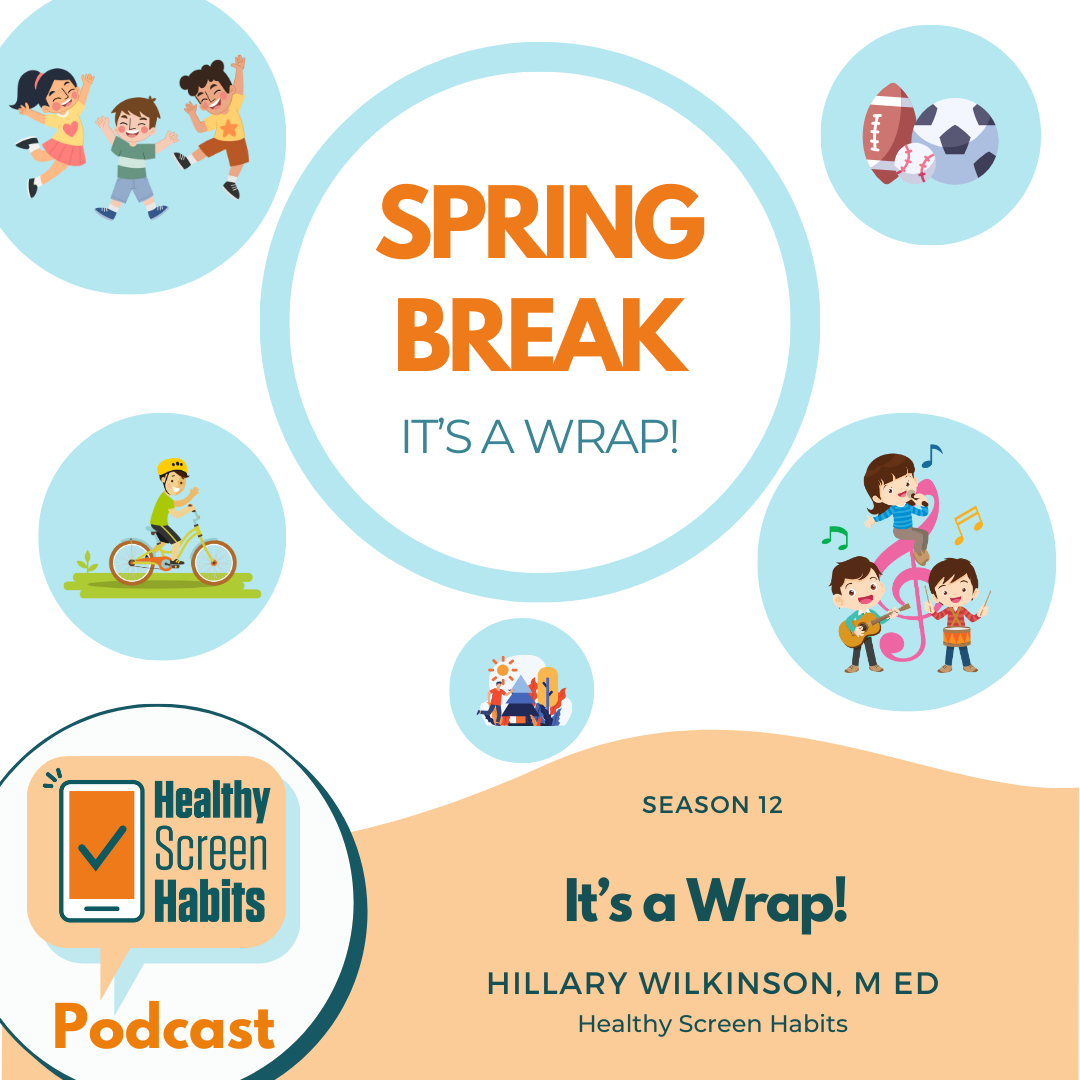
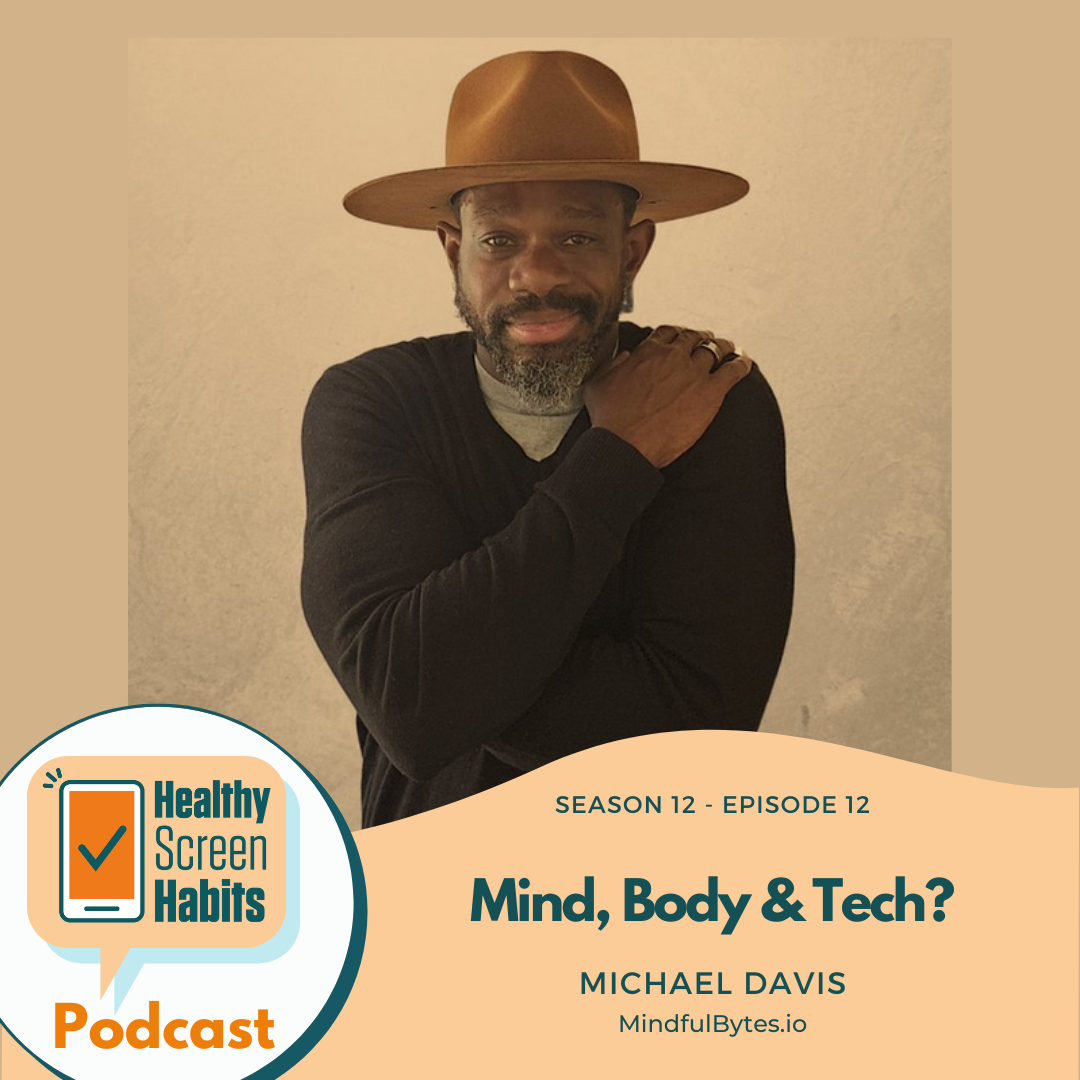
Contact Info
Email:
info@healthyscreenhabits.org
Mailing address:
144 W. Los Angeles Ave. #106-362, Moorpark, CA 93021
All Rights Reserved | Healthy Screen Habits is a registered 501(c)(3) nonprofit





